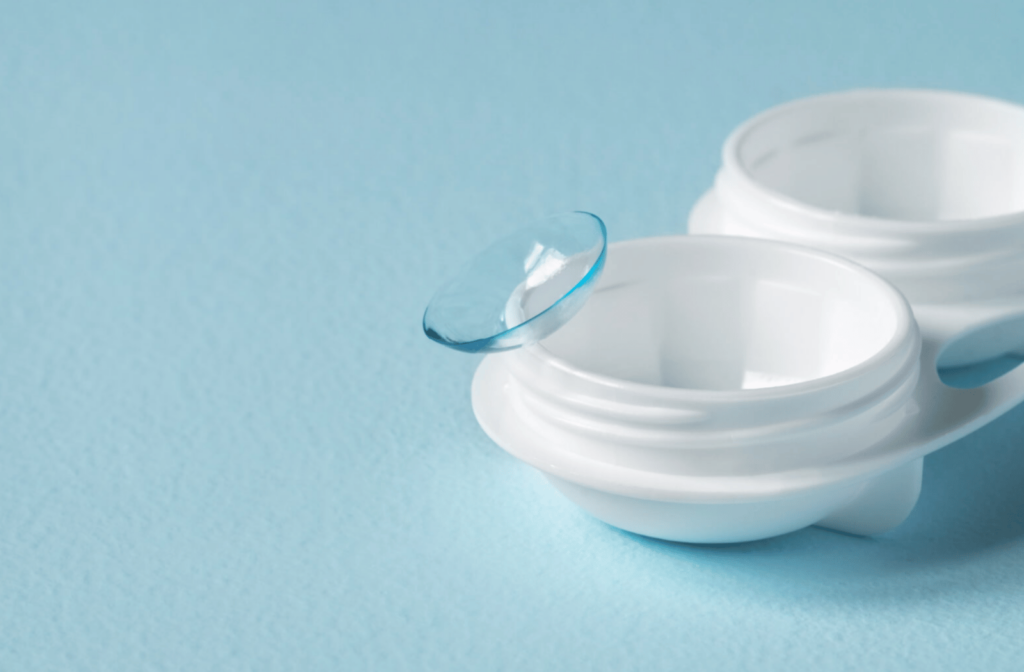These days, no matter your lifestyle or vision needs, your eye doctor can find you the best contact lenses to support your vision. Whether for sports, special occasions, or daily use, contact lenses offer an alternative to traditional glasses.
However, like any other product, questions arise about their shelf life. Contact lenses do have expiry dates to prevent potential harm to your eyes.
All About Contact Lenses
Contact lenses are small medical devices that sit directly on your eye. They can provide clearer vision than glasses as they move with your eyes and don’t obstruct your vision. There are several types of contacts and different materials, such as soft lenses, rigid gas permeable (RGP) lenses, and various specialty lenses.
Soft lenses are flexible and conform to the shape of your eye. RGP lenses are firmer and can provide sharper vision for some users. Specialty lenses come in various forms, including sclerals, which are wider and vault over the cornea to rest on the sclera (the whites of the eye).
The lens type can influence how long they last and their expiration date.
Expiration Dates on Contact Lens Packaging
You might be surprised to learn that many contact lenses have an expiration date printed on the packaging. Soft contact lenses can have an expiration of 4 years from the date the lens was manufactured and packaged. In contrast, rigid gas-permeable contacts don’t require an expiration date as they aren’t packaged in fluid.
The expiration date on the lens package indicates that they should be free from contamination and safe to wear. There’s a possibility that the seal on the contact lens container becomes compromised over time which can contaminate the saline solution and lens inside.
Apart from the expiration date, the packaging also includes:
- The brand name
- Lens material name
- Name of manufacturer
- Base curve of the lens
- Lens diameter
- Lens power
- Lot number
The expiration date lists the month and year and is a guideline for when the manufacturer believes the lenses will remain contamination-free and in optimal condition. The date typically considers factors like the lens material, water content, and the packaging solution.
Expiration Date for Contact Lens Prescription
Contact lenses are considered medical devices prescribed by your eye doctor after they conduct an eye exam and contact lens fitting. A valid prescription generally contains optical information, the prescribing optometrist’s signature, the issue date, and the expiry date.
It’s essential to heed these dates as using lenses beyond the expiration can result in discomfort, decreased visual clarity, and potential eye infections. The Canadian Association of Optometrists recommends that contact lens prescriptions last no longer than 2 years. However, this depends on your particular eye health and vision needs.
Factors Influencing Contact Lens Longevity
The longevity of your contact lenses can depend on various factors, including the lens type, your wearing schedule (daily or extended-wear contacts), how well you care for them, and the surrounding environment.
Soft contact lenses, for instance, are generally less durable and more susceptible to contamination. RGP lenses are easier to keep clean and less likely to absorb foreign material from the eye or environment.
If you wear daily disposable lenses, the expiration date is the same day you wear them, meaning you discard them at the end of the day. However, for extended-wear lenses, the wearing schedule, cleaning routine, and storage play a significant role in determining their lifespan.
Proper Lens Care & Storage
Contact lenses come with many benefits but also risks. If you plan on wearing contacts, you can take the necessary precautions to minimize your risk and protect your vision, such as:
- Wear contact lenses prescribed and fitted by your eye doctor.
- Do not wear your contact lenses longer than recommended or beyond the expiry date.
- Follow your eye doctor’s instructions for cleaning and disinfecting your lenses.
- Wash your hands before handling contact lenses.
- Only use contact lens solution to clean contacts, never water or saliva.
- Avoid sleeping in your contacts, as this can increase your risk of infection.
Signs of a Problem
Even if your lenses haven’t reached their printed expiration date, there may be an issue with them if you experience:
- Discomfort
- Dryness
- Pain
- Blurry vision
- Redness
If you have any of the above symptoms, remove your contact lenses and contact your eye doctor. These symptoms could indicate that your lenses have deteriorated or become contaminated, potentially due to expired lenses, expired solutions, or improper storage.
When to Seek Professional Advice
When in doubt about the condition of your contact lenses, always consult your eye care provider. Regular eye exams are essential to ensure your lenses are still suitable for your vision needs and that your eyes are healthy.
Your eye doctor can evaluate your eyes, recommend appropriate lens replacements if necessary, and provide guidance on proper lens care techniques.
Healthy & Comfortable Vision with Contact Lenses
Contact lenses offer unparalleled convenience and visual clarity compared to glasses. However, to benefit from these devices and prevent adverse reactions, it’s vital to understand the importance of not wearing them past their expiration dates.
Apart from expiry dates, their longevity and safety depend on the contact lens type, care routine, and usage schedule. Always adhere to the manufacturer’s and your eye doctor’s recommendations.
And when unsure about your symptoms, the condition of your lenses, or vision changes, book an appointment with Maple Ridge Eye Care.


